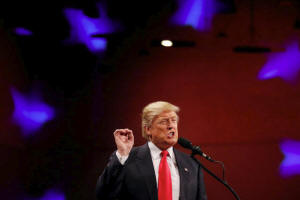|
Conflict over Russia is rocky start for
Trump and intelligence agencies
 Send a link to a friend
Send a link to a friend
 [December 12, 2016]
By John Walcott [December 12, 2016]
By John Walcott
WASHINGTON (Reuters) - President-elect
Donald Trump's rejection this weekend of U.S. intelligence analysts'
conclusion that Russia intervened in the 2016 election to help him win
the White House is the latest in a string of conflicts between Trump and
the intelligence community he will command.
Most of them involve Russia, which has grown increasingly aggressive -
according to what U.S. intelligence agencies have told Congress and the
administration of President Barack Obama - in Syria and Ukraine. The
agencies also reported that Russia has ratcheted up activities in
cyberspace including meddling, sometimes covertly, in European and U.S.
elections.
The intelligence agencies have concluded with "high confidence" that not
only did their Russian counterparts direct the hacking of Democratic
Party organizations and leaders, but they did so to undermine Democratic
candidate Hillary Clinton, not just to shake confidence in the U.S.
electoral system, a senior U.S. official said on Friday.
The president-elect's transition office responded by releasing a
statement that exaggerated his margin of victory and attacked the U.S.
intelligence community's work on Iraq, but did not address the analysts'
conclusion about Russia.
"These are the same people that said Saddam Hussein has weapons of mass
destruction," the statement said. "The election ended a long time ago in
one of the biggest Electoral College victories in history. It's now time
to move on and 'Make America Great Again.'"

In a statement issued on Saturday, California Democrat Adam Schiff, a
member of the House intelligence committee, called the Russian hacking
of the U.S. election "spectacularly successful."
"One would also have to be willfully blind not to see that these Russian
actions were uniformly damaging to Secretary (of State Hillary) Clinton
and helpful to Donald Trump," Schiff said. "I do not believe this was
coincidental or unintended."
Trump has rejected the intelligence agencies' finding.
"I don't believe they interfered," he told Time magazine about Russia in
an interview published this week. "That became a laughing point, not a
talking point, a laughing point. Any time I do something, they say, 'Oh,
Russia interfered.'"
Russian officials have denied all accusations of interference in the
U.S. election.
The president-elect has been receiving the President's Daily Brief
(PDB), one of the most highly classified documents in the U.S.
government and which can include details of U.S. and allied covert
operations, only once a week. That is far less often than most of his
predecessors.So far, intelligence officials said, Trump has not
requested a special briefing on Russia, despite the agencies' warnings
that Russian President Vladimir Putin is trying to undermine
trans-Atlantic unity and test U.S. and allied resolve.
'INCIDENTAL CONTACT'
In fact, two officials with knowledge of the situation said on Saturday
that Trump's transition team has made only "incidental contact" with the
Central Intelligence Agency. This is despite the fact that Trump's
choice to head the CIA, U.S. Representative Mike Pompeo, has limited
experience working with the agency. The Kansas Republican served on the
House Intelligence Committee and the select committee investigating the
2012 attack on U.S. diplomatic and intelligence facilities in Benghazi,
Libya.
[to top of second column] |

President-elect Donald Trump speaks at the USA Thank You Tour event
at the Iowa Events Center in Des Moines, Iowa, U.S., December 8,
2016. REUTERS/Shannon Stapleton/File Photo

Democrats and some Republicans in Congress who have been briefed on
the Russian activities share the intelligence agencies' alarm about
Trump's plans for the 17-agency intelligence community, which
includes the National Security Agency, the Defense Intelligence
Agency and the National Counterterrorism Center.
Privately, some members of the clandestine service, the CIA's body
of spies, said they would resign rather than obey any order to
resume waterboarding or other "enhanced interrogation techniques"
that Trump endorsed during his campaign.Elsewhere in the $70
billion-a-year intelligence community officials on Saturday said
they fear that Trump might invite legal trouble by trying to vastly
expand electronic and physical surveillance of suspected terrorists
based on their religion or national origin.
None of that may come to pass, of course, and campaign rhetoric and
tweets do not always predict policies, the officials
conceded.However, Trump's statements about Russia and business
dealings there, as well as those of retired Army Lieutenant Michael
Flynn, his choice for national security adviser, are worrisome to
many of the officials tracking Putin's growing aggressiveness from
seas to skies to cyberspace.
Obama has ordered the intelligence agencies to review cyber attacks
and foreign intervention into the 2016 election and deliver a report
before he leaves office on Jan. 20, the White House said on Friday.
Obama's homeland security adviser, Lisa Monaco, told reporters on
Friday the report's results would be shared with lawmakers and
others.


"The president has directed the intelligence community to conduct a
full review of what happened during the 2016 election process ...
and to capture lessons learned from that and to report to a range of
stakeholders, to include the Congress," she said during an event
hosted by the Christian Science Monitor.
(Additional reporting by Patricia Zengerle in Washington; Editing by
Matthew Lewis)
[© 2016 Thomson Reuters. All rights
reserved.]
Copyright 2016 Reuters. All rights reserved. This material may not be published,
broadcast, rewritten or redistributed. |